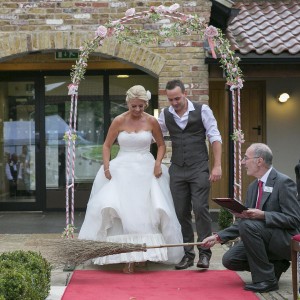
Who’s Heard of A Civil Celebrant
Although I do my best to get about and spread the word, I find there’s still a lot of confusion about what civil celebrants really do and what they can offer. I hope that this brief blog can clear things up a bit.
Imagine …!
What if a full religious wedding doesn’t rock your boat?
What if the totally non-religious, standardised Register Office ceremony isn’t really all that special for your big day?
What if you could go to the Registry Office in the morning in your jeans, with a couple of witnesses, sign the marriage certificate and then enjoy a wonderful, joyous, memorable ceremony in the afternoon with all your guests?
Nowadays, you can. That’s where a civil celebrant comes in.
As long as the legal bit is still carried out, there’s nothing to stop you holding the ceremony you actually want – at the venue you want, in the way that you want.
The Ceremony
One of the beauties about a celebrant-led wedding is that he or she will help you (as much or as little as you want!) to build your own ceremony. So if you want a religious component (or perhaps one or two drawn from various cultural sources), put that in, by all means; if you want spiritual elements, go for it; poems and favourite texts are absolutely fine. With some give and take, you should be able to please yourselves AND keep your parents happy!
As with the readings, you decide on the music. You also decide on the choreography (who walks or stands where), the readers, any address, the wording, and delivery, of the Vows. Your celebrant will be pleased to advise and make helpful suggestions. This process is usually conducted by e-mail after an initial mutual fact-finding conversation (face-to-face or by Skype).

Ritual
You will be able to incorporate any rituals and little touches of your choice that would not otherwise be possible. For example, drinking from a loving cup, burning a Unity Candle, Jumping the Broom or celebrating a handfasting (an ancient Celtic betrothal ritual).
Conclusion
In short, this is YOUR day, and your civil celebrant, who will of course conduct the ceremony for you, will do everything to ensure that the day is unforgettable, meaningful and what YOU want.
I hope this clarifies things. If you still have questions, don’t hesitate to ask me! I’ll be delighted to help.
Michael Gordon can help prepare and conduct a tailor-made civil ceremony (including weddings, vow renewals, handfastings, ring blessings, baby namings) in or around London or, indeed, Europe.
